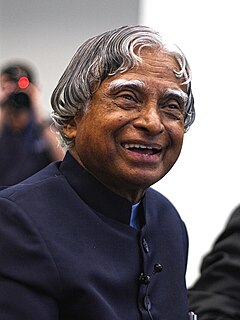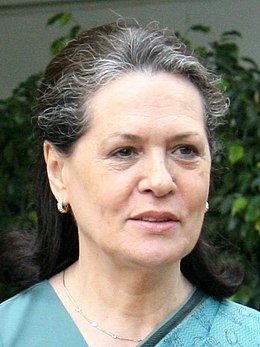
Purno Agitok Sangma was an Indian politician who served as the Speaker of the Lok Sabha from 1996 to 1998 and Chief Minister of Meghalaya from 1988 to 1990.
The National Democratic Alliance (NDA) is a coalition of Progressive centre-right to right-wing political parties in India. At the time of its formation in 1998, it was led by the Bharatiya Janata Party (BJP) and had 13 constituent parties. Its chairman was late Prime Minister Atal Bihari Vajpayee. Also representing the alliance are L. K. Advani, former Deputy Prime Minister, who is the acting chairman of the Alliance, Narendra Modi, current Prime Minister and the Leader of the House in Lok Sabha; and Arun Jaitley, Leader of the House in Rajya Sabha and Finance minister. The coalition ruled from 1998 to 2004. The alliance returned to power in the 2014 General election with a combined vote share of 38.5%. Its leader, Narendra Modi, was sworn in as Prime Minister of India on 26 May 2014.
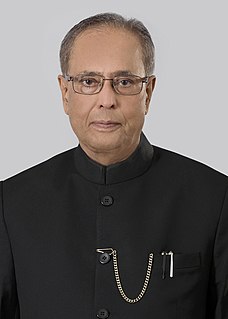
Pranab Mukherjee is an Indian politician who served as the 13th President of India from 2012 until 2017. He is a Bharat Ratna awardee, awarded in 2019 by President of India Shri Ram Nath Kovind. In a political career spanning five decades, Mukherjee has been a senior leader in the Indian National Congress and has occupied several ministerial portfolios in the Government of India. Prior to his election as President, Mukherjee was Union Finance Minister from 2009 to 2012.
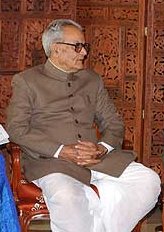
Bhairon Singh Shekhawat was the 11th Vice President of India. He served in that position from August 2002, when he was elected to a five-year term by the electoral college following the death of Krishan Kant, until he resigned on 21 July 2007, after losing the presidential election to Pratibha Patil. Shekhawat was a member of the Bharatiya Janata Party (BJP), a leading member of the National Democratic Alliance at the time of election. He served as the Chief Minister of Rajasthan three times, from 1977 to 1980, 1990 to 1992 and 1993 to 1998.
Rashtriya Lok Dal is a political party in India. Chaudhary Ajit Singh is the founder and the president of the party.He is carrying on the political legacy of his father and former Prime Minister of India, Charan Singh and the original Lok Dal.

Shankersinh Vaghela is an Indian politician from Gujarat. He was the Leader of Opposition in 13th Gujarat Legislative Assembly.

Meira Kumar is an Indian politician and five-time Member of Parliament who was the United Progressive Alliance nominee for President of India in the 2017 election. She was elected unopposed as the first woman Speaker of Lok Sabha and served from 2009 to 2014. Prior to being a member of the 15th Lok Sabha, she had been elected earlier to the 8th, 11th, 12th and 14th Lok Sabha. She served as a Cabinet Minister in the Ministry of Social Justice and Empowerment of Manmohan Singh's Congress led Government (2004–2009).

The Election Commission of India held indirect 13th presidential elections of India on 19 July 2007. Pratibha Patil with 638,116 votes won over her nearest rival Bhairon Singh Shekhawat who got 331,306 votes. This result meant that Pratibha Patil became the first female President of India.

India held general elections to the 15th Lok Sabha in five phases between 16 April 2009 and 13 May 2009. With an electorate of 714 million, it was the largest democratic election in the world till the Indian General Elections 2014 held from 7 April 2014.

Harish Chandra Singh Rawat is an Indian politician who was Chief Minister of Uttarakhand from 2014-2017. A five-time Member of Parliament, Rawat is a leader of the Indian National Congress party. As a member of 15th Lok Sabha, Rawat served as Union Minister of Water Resources in the cabinet of Prime Minister Manmohan Singh from 2012 to 2014. He also worked as Minister of State at the Ministry of Parliamentary Affairs, Ministry of Agriculture, Ministry of Food Processing Industries (2011-2012) and Ministry of Labour and Employment (2009-2011).
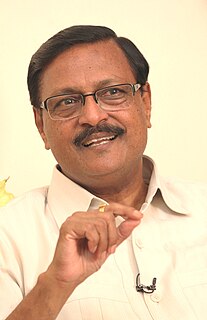
Satya Pal Jain is the Additional Solicitor General of India & Member of the Law Commission of India. He is a Member of Bharatiya Janata Party (BJP) National Executive Committee. He was elected Member of Parliament from Chandigarh in 1996 and 1998. He is a practising Senior Advocate in the Supreme Court of India and the Punjab and Haryana High Court at Chandigarh.

The Indian general election, 2014 was held to constitute the 16th Lok Sabha, electing members of parliament for all 543 parliamentary constituencies. Running in nine phases from 7 April to 12 May 2014, it was the longest election in the country's history. According to the Election Commission of India, 814.5 million people were eligible to vote, with an increase of 100 million voters since the last general election in 2009, making it the largest ever election in the world. Around 23.1 million or 2.7% of the total eligible voters were aged 18–19 years. A total of 8,251 candidates contested for the 543 Lok Sabha seats. The average election turnout over all nine phases was around 66.38%, the highest ever in the history of Indian general elections.
Members of the 15th Lok Sabha were elected during the 2009 general election in India. It was dissolved on 18 May 2014 by President Pranab Mukherjee.

Agatha Kongkal Sangma is a former Member of Parliament of India (MP), and was part of the 15th Lok Sabha. She represented the Tura constituency of Meghalaya following the 2009 parliamentary election as a candidate of the Nationalist Congress Party (NCP). She was the youngest Minister of State in the UPA 2nd Manmohan singh Cabinet.
The elections in 2012 were scheduled for seven Vidhan Sabhas and several local elections were also conducted. The 14th presidential election to elect the 13th president of the republic was also held in 2012. The tenure of the legislative assemblies of Goa, Gujarat, Himachal Pradesh, Manipur, Punjab, Uttar Pradesh and Uttarakhand were to expire during the year. The Election Commission of India issued the dates for the elections in Manipur, Punjab, Uttarakhand, Uttar Pradesh and Goa to take place in the first quarter of the year. Whereas the elections were held in Himachal Pradesh and Gujarat in the last quarter of the year.
Ajay Rai is an Indian politician and former member of Uttar Pradesh Legislative Assembly. He is a five-time MLA from Uttar Pradesh.
This article outlines the events leading up to the Indian general election, 2014 from 7 April to 12 May 2014, starting with the prior election in 2009.

A presidential election was held in India on 17 July 2017 with the votes counted and the results announced on 20 July 2017. Ram Nath Kovind became 14th President of India. President Pranab Mukherjee, whose term of office was due to expire on 24 July 2017, declined to seek re-election due to health concerns and old age.
The North-East Democratic Alliance or NEDA is a political coalition that was formed on May 24, 2016 by Bharatiya Janata Party along with regional political parties of North East India like Naga People's Front, Sikkim Democratic Front, People's Party of Arunachal, Asom Gana Parishad and Bodoland People's Front in Northeast India. The motive of the new political front was to protect the interest of the people of the region as well as uniting non-Congress parties in Northeast India. Himanta Biswa Sarma was appointed as the convenor of the front.
Elections in the Republic of India in 2018 included by-elections to the Lok Sabha, elections to the Rajya Sabha, elections to legislative assemblies of eight states and numerous other by-elections to state legislative assemblies, councils and local bodies.








